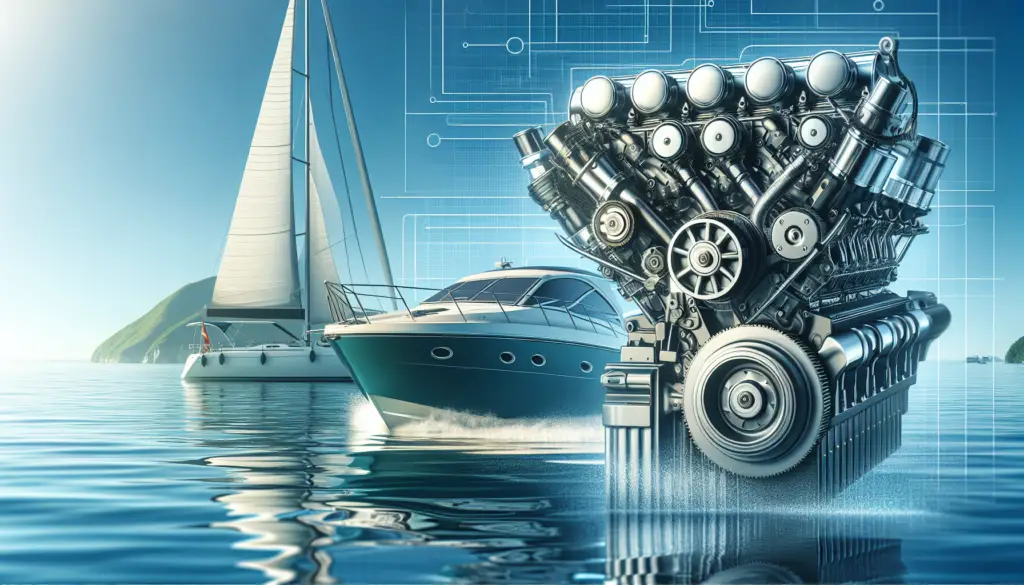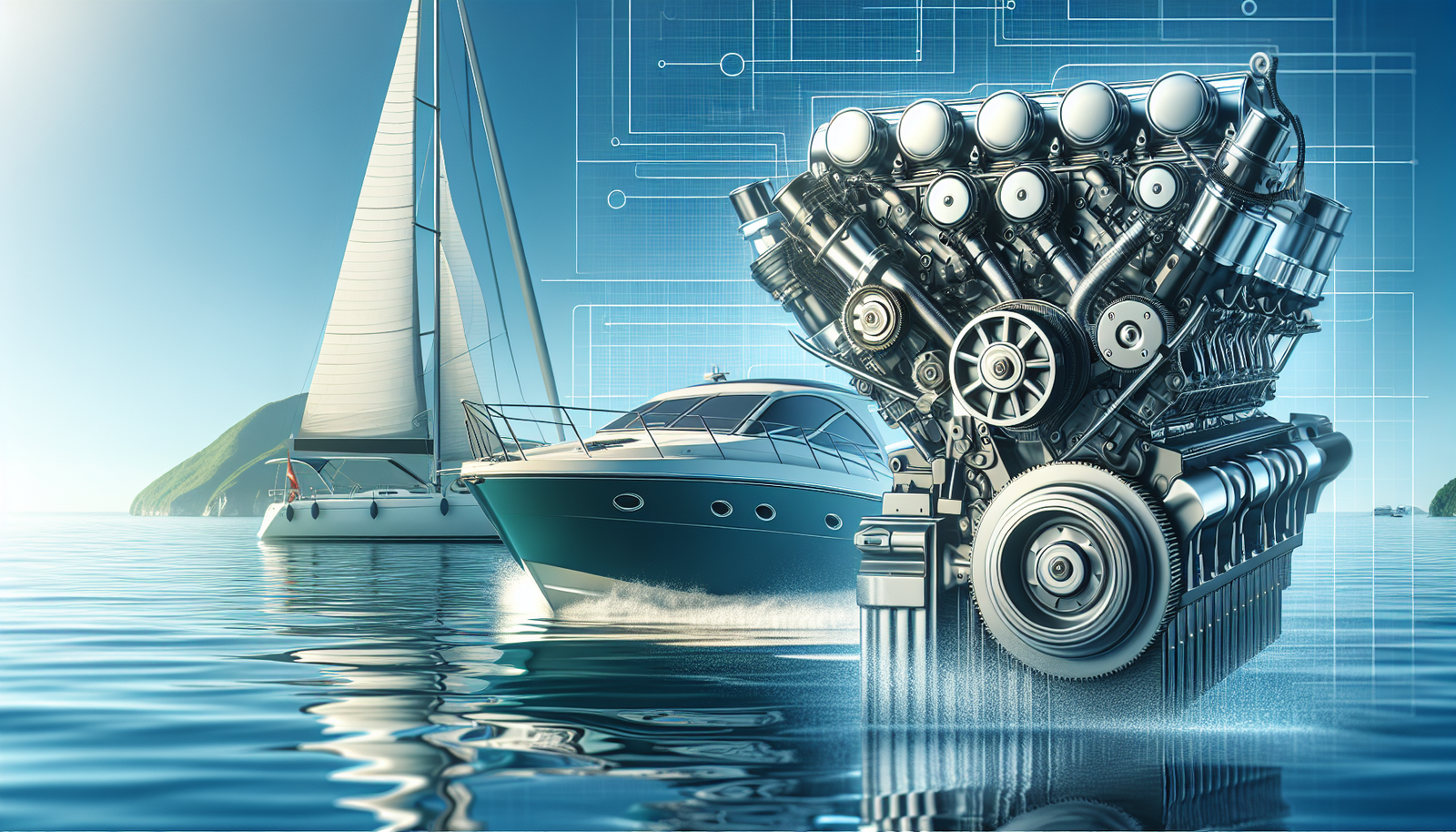Picture yourself at the helm, the wind in your hair, and the open sea before you. Perfect, right? In a moment, however, this peaceful scene could become a nightmare if your boat engine fails. That’s where “Essential Boat Engine Safety Tips For Smooth Sailing” comes in. This guide is going to arm you with vital knowledge and practical tips, ensuring your boat engine runs dependably and effectively. You’ll learn the importance of regular maintenance and how to troubleshoot potential issues before they become real problems. With these insights at your disposal, you’ll be able to cruise with confidence.

Understanding Your Boat Engine
Before you start exploring the open waters, it’s essential you understand the workings of your boat engine. Similar to a car engine, a boat engine converts fuel energy into mechanical energy to propel the boat. If you’re a new boat owner, learning about your boat engine fosters confidence in handling it. If you’re a seasoned sailboat captain, refreshing your knowledge ensures smooth sailing.
Basics of a boat engine
A boat engine operates pretty much the same way as an automobile engine. It has many moving parts working in tandem, including pistons, a crankshaft, and connecting rods. Your awareness of these parts and their functionalities can prevent potential engine failures.
Knowing different engine types
Boat engines come in various types, each with its unique functionalities and requirements. These include the common outboard engine, inboard engine, inboard/outboard (stern drive), and water jet. Understanding the unique properties of these engine types will help you maximize their performance and longevity.
Understanding boat engine fuel types
Another important thing to know about your boat engine is the type of fuel it uses. The prevalent fuel types are petrol, diesel, and electric. Petrol engines are quick to start and good for high-speed running, while diesel engines are more efficient and have a longer lifespan. Electric engines are eco-friendly but don’t often deliver the same speed as petrol or diesel.
Performing Regular Engine Checks
Performing regular engine checks is a preventive step to prolong the life of your engine. Routine checks help you identify any unusual signs and fix them promptly.
General engine check guidelines
Before every departure, ensure to carry out basic checks such as the oil level, coolant level, and insulating the fuel system. Always have a checklist handy to avoid forgetting essential tasks.
Understanding engine indicators
Engine indicators serve as your first line of defense against potential engine trouble. They are your boat’s way of communicating with you. Keep an eye on temperature gauges, oil pressure indicators, and RPMs.
Checking the engine oil
Oil is the lifeblood of your engine. Checking for its color and consistency is crucial in predicting a potential engine issue. Dark oil may indicate engine dirt build-up, while a milk-like consistency could suggest a coolant leak.
Monitoring engine coolant levels
The level of the coolant is a vital indicator of engine well-being. A low coolant level may cause the engine to overheat and subsequently fail. Always ensure the coolant level is within the recommended limits.
Inspecting for leaks
A leak on your boat can cause significant damages if ignored. Regularly inspect your boat engine for signs of leaks. Common areas to check include the oil pan, fuel lines, and coolant hoses.
Having Essential Engine Tools Onboard
An engine malfunction does not always mean you have to tow your boat back to shore. With the right tools onboard, you can make minor repairs and continue your journey.
Importance of carrying essential engine tools
Having essential engine tools onboard helps you address minor engine issues. This way, you can prevent further damages and potential costly repairs.
List of must-have engine tools
A basic marine toolkit should include pliers, screwdrivers, adjustable wrenches, spark plug wrench, hammers, and socket sets. Certain types of boats may require specific tools. It’s advisable to consult your boat manual for a comprehensive list.
Storing engine tools properly
Tools can be rendered useless if they are not properly taken care of. Ensure to keep them dry and store them in a secure, rust-resistant toolbox.

Knowing How to Respond to Engine Troubles
Having knowledge about boat engines does not make you immune to engine troubles. It’s important you know how to respond when these troubles arise.
Identifying common engine troubles
Some common boat engine troubles include engine overheating, irregular engine sound, excessive smoke, and sudden loss of power. Familiarize yourself with these signs to enable quick and effective response.
Knowing when to call for help
Engine issues can range from simple to complicated. Knowing when to tackle them yourself and when to call for professional help is crucial. Serious issues such as mechanical failure require the expertise of a professional mechanic.
Basic engine troubleshooting steps
Simple engine troubles like a dead battery or a clogged fuel filter can be addressed through troubleshooting. Troubleshooting steps typically include checking your boat’s ignition system, fuel system, and electrical system.
Maintaining the Boat Engine
Regular maintenance is key to keeping your boat engine running smoothly. It’s not only about addressing issues after they occur, but also about preventing them from happening in the first place.
Importance of regular engine maintenance
Regular engine maintenance improves engine performance and longevity. It also reduces the chances of costly repairs and enhances overall boat safety.
Professional maintenance vs. DIY
While some maintenance tasks can be done by yourself, others demand professional attention. Tasks like replacing engine coolant and oil, changing spark plugs, and replacing air filters can be done DIY style. For tasks like adjusting valves, servicing the fuel injection system, and significant engine repairs, seeking professional help is the best choice.
Preventive maintenance practices
Preventive maintenance practices vary depending on your engine type and usage. However, general practices include regular oil changes, filter changes, cooling system checks, and fuel system inspections.
Engine cleaning and upkeep
Keeping your engine clean contributes to its efficiency. Using fresh water and a mild detergent, regularly clean your engine to remove dirt, grease, and salt, preventing corrosion and overheating.
Dealing with Fuel and Combustion
Learning how to deal with fuel and combustion is vital for any boat owner. This includes understanding the combustion process and adhering to safe refuelling practices.
Understanding combustion process
The combustion process in an engine involves mixing fuel with air to generate power. A disruption in this process, such as a clogged fuel line or dirty carburetor, will affect your engine’s performance.
Safe refuelling practices
When refuelling your boat, always turn off the engine and ensure the boat is ventilated adequately. Avoid spills by not overfilling the tank. Always have a fire extinguisher at hand during refuelling.
Handling fuel leaks
Fuel leaks are dangerous and should be addressed immediately. If you notice a fuel leak, shut down the engine, isolate the battery, remove all ignition sources, and have the leak fixed promptly.
Dealing with fire safety on a boat
Fire safety should be a top priority on any boat. Always have a fire extinguisher handy. Regularly check to ensure it’s functioning correctly. Ensure that all the passengers know their roles during a fire emergency.
Considerations for Long Trips
Long boat trips place an extra demand on your engine. Preparing and maintaining your engine during these trips will go a long way to ensure smooth sailing.
Engine considerations for long sailing trips
During long trips, your engine will be under continuous operation, which can lead to faster wear and tear. Knowing this, it’s advisable to do a comprehensive check before you begin your journey.
Preparing the engine for a long journey
Preparing your engine for a long trip involves carrying out general maintenance, stocking up extra fuel, mapping out refuelling stations, and packing necessary spare parts and tools.
Maintaining engine health mid-journey
While on a long trip, make a habit of regularly checking your engine. Check the oil and coolant levels, and look out for any unusual signs.
Importance of Engine Ventilation
Engine ventilation is critical for engine safety. It aids in managing engine temperature and preventing build-up of dangerous gases.
Role of ventilation in engine safety
Ventilation systems aid in removing excess heat from the engine compartment, preventing overheating. They also help to vent out harmful and potentially explosive gases from the fuel system.
Checking and maintaining engine ventilation systems
Regularly check your ventilation system. Ensure the vents are clean and unblocked. Check the fan’s working condition, as this aids in the circulation of fresh air in the engine compartment.
Dealing with ventilation issues
When faced with ventilation issues, it’s advisable not to run the engine. Ventilation issues might lead to overheating and build-up of dangerous gases which can be harmful to you and your boat.
Weather and Boating Safety
Weather plays a critical role in your boating experience. Understanding its impact on your boat engine is key to ensuring safety.
Understanding the impact of weather on engine safety
Extreme weather conditions can affect your engine’s performance. For instance, cold weather can make it hard to start your engine, while extremely hot weather can lead to overheating.
Preparing for different weather conditions
Before setting sail, it’s important to check the weather forecast. Carrying out weather-specific procedures like winterizing your engine during cold weather or ensuring that your cooling system is functioning effectively during hot weather is essential.
Weather-related engine safety tips
If you’re in extreme cold, ensure to use winter-grade oil and coolant, and store your boat properly. During hot weather, regularly check your cooling system and keep the engine ventilated.
Understanding Emergency Engine Situations
Being prepared for emergency engine situations can be the difference between a minor hiccup and a significant catastrophe.
Practising emergency engine procedures
Familiarize yourself with emergency procedures, including restarting your engine, disconnecting the fuel line, and using a fire extinguisher. Regular practice of these procedures is essential to remain calm during real emergencies.
Recognizing signs of engine failure
Engine failure signs may include unusual noises, smoke, loss of power, and control anomalies. Be sure to take these signs seriously and act immediately.
Steps to take in case of engine emergency
In case of an engine emergency, remember to keep calm. Follow the appropriate emergency procedures, call for help if needed, and always ensure everyone’s safety onboard before doing anything else.

